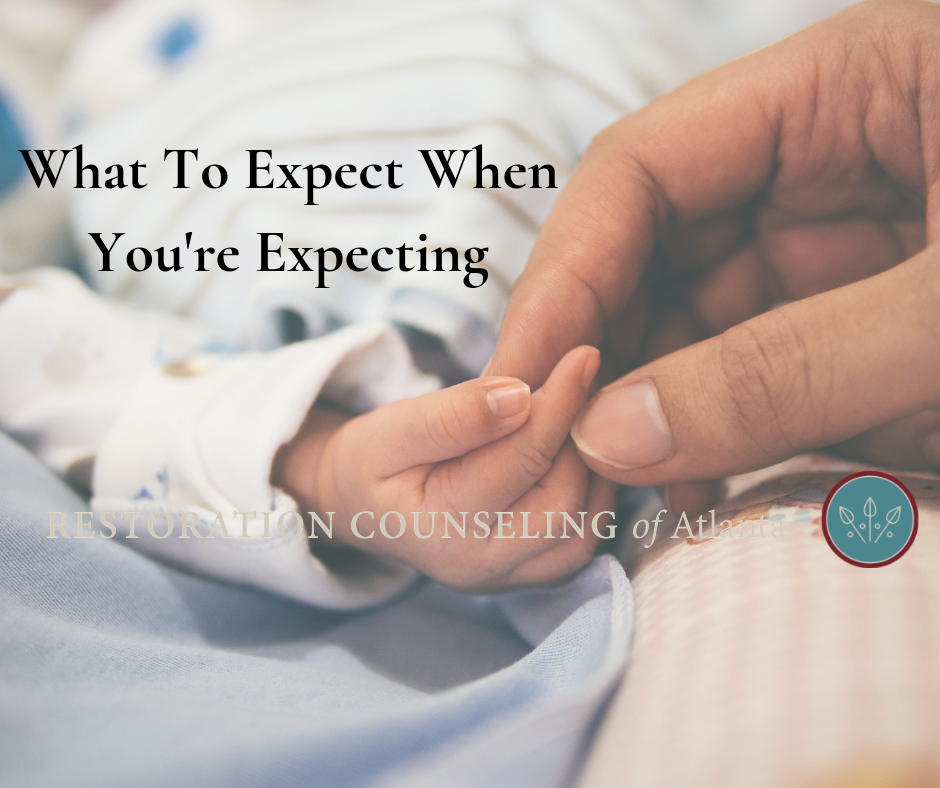Expecting a baby is generally thought to be an exciting joy-filled time. It’s certainly a busy time. You’re planning a room, choosing a name, buying baby clothes, accessories, and products. Advertising and social media paint a picture that often fails to depict the common realities of pregnancy and motherhood.
Facts about Postpartum
Statistics show that 1 in 7 moms experience postpartum depression. Think about how common that is! Out of every 7 mothers that you know, probably one of them has struggled in this area. Common knowledge about postpartum depression (PPD) places it as occurring only after the typical “baby blues.” Newer research shows that PPD can happen during pregnancy and anytime within the first year after birth. So what that means is a mom with a newborn may feel fine for 3-6 months after the birth of her baby and then out of nowhere, she finds herself struggling emotionally. Ready for some more shocking news? 1 in 10 dads also struggle with PPD! This is not just a hormone related issue.
We also know that PPD isn’t all that mothers may struggle with. Another common concern is postpartum anxiety (PPA). Whereas PPD is similar to regular depression and therefore easier to spot, PPA is often a bit different than regular anxiety. One symptom of PPA can be racing thoughts or worries about the health and safety of the baby. This anxiety and worry may keep the mother from telling others. Anger can also be common, leading mom to feel like she’s a terrible mother. This can increase the mother’s shame and ability to reach out for help.
Other Pregnancy Related Disorders
Other pregnancy related mood concerns might be Postpartum Obsessive Compulsive disorder (POCD), Postpartum Post-traumatic stress disorder (PPTSD), Postpartum Bi-polar, and Postpartum Psychosis.
- POCD symptoms will take those common intrusive thoughts to the level of repetitive behaviors or hypervigilance to try to ease those fears. This mom is horrified about the thoughts and is very unlikely to act on them.
- PPTSD is common when the birth experience was traumatic from the mother’s perspective. It can also be caused by stressful events like having a baby in the NICU, leading mom to experience flashbacks of the trauma. This can result in tendencies to avoid common reminders like birth photos/ stories, hospitals, or even birthday celebrations.
- Postpartum Bi-polar is similar to typical bi-polar in that there are phases of low moods and phases of high moods. The severity of the phases can determine if someone is struggling with Bi-polar 1 or Bi-polar 2. Because this can often be misdiagnosed as depression, it is important to seek professional help to determine the right diagnosis and treatment. Treating just the depression, in this case, can result in increased severity.
- Postpartum psychosis is often seen as the only alternative to postpartum depression and is why women fear disclosing their frightening thoughts. Postpartum Psychosis is rare (1/1000) and has the hallmark trait that the mom’s bizarre thoughts do not concern her. Her hyperactivity, severe mood swings, paranoia, irrational thoughts, and/or hallucinations represent a mental break from reality. If you or a loved one is experiencing these types of symptoms, it is imperative that professional help is sought immediately. Symptoms are temporary and treatable but require prompt attention1.
Resources That Can Help
The goal of this article is not to induce fear, but to equip families to know what to expect. You are not alone, and with proper treatment, moms will get better. Social media and cultural expectations place tremendous unrealistic demands on families, especially moms. We have to start educating people and work on removing the stigma associated with emotional struggles. If you find yourself wanting to learn more about these topics, Postpartum Support International (www.postpartum.net) is an excellent resource for information and professionals that can help. Professionals trained in treating Perinatal Mood Disorders can also be found on their website.
 Written by: Debbie Turner, MAMFT, LPC
Written by: Debbie Turner, MAMFT, LPC
debbiet@restorationcounselingatl.com, ext. 157
Roswell Location
Debbie Turner received her Master’s in Marriage and Family Therapy from Richmont Graduate University; an academically sound, Christ-centered program. She is passionate about helping individuals and couples learn new ways of connecting with Christ and others to facilitate healing, transformation, and restoration.
Debbie has also completed training from Postpartum Support International. She is qualified to assess and treat women struggling with issues like depression, anxiety, anger, intrusive thoughts, or repetitive behaviors that can occur during pregnancy or after delivery.

